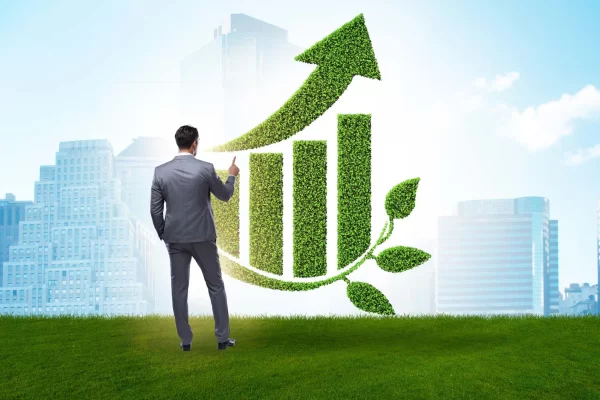The Rise of Sustainable Investing: Shaping the Future of Finance
In an era where financial decisions are increasingly intertwined with global values, sustainable investing has emerged as a transformative force in the world of finance. Beyond mere profit, this approach, also known as socially responsible investing (SRI) or environmental, social, and governance (ESG) investing, incorporates ethical considerations into investment strategies. As more investors seek alignment between their portfolios and their principles, sustainable investing is paving the way for a more conscientious financial future.
Unpacking Sustainable Investing:
Sustainable investing goes beyond conventional financial analysis by integrating ESG criteria into the decision-making process. These criteria assess how companies impact the environment, manage social responsibilities, and uphold governance standards. By evaluating these factors, investors aim to support businesses that not only perform well financially but also contribute positively to society and the planet.
The Significance of Sustainable Investing:
- Environmental Stewardship: With growing concerns about climate change and environmental degradation, sustainable investing encourages companies to adopt green practices, reduce waste, and invest in renewable energy. This approach helps address critical environmental issues while promoting sustainable growth.
- Social Responsibility: Investors are increasingly focused on social issues, such as labor rights, diversity, and community development. Sustainable investing supports companies that champion ethical labor practices, foster inclusive work environments, and engage in positive social initiatives.
- Governance Excellence: Effective governance ensures transparency and accountability. Companies with strong governance frameworks are better equipped to manage risks and provide long-term value. Sustainable investing prioritizes businesses with ethical leadership and robust governance practices.
The Momentum Behind Sustainable Investing:
Sustainable investing is not a fleeting trend; it’s a dynamic and growing sector. According to the Global Sustainable Investment Alliance (GSIA), assets in sustainable investments surpassed $35 trillion in 2020, marking a significant increase from previous years. This rise is driven by several key factors:
- Investor Demand: A new generation of investors, particularly millennials and Gen Z, is driving the shift towards values-based investing. They are eager to put their money into ventures that reflect their personal values and contribute to societal well-being.
- Regulatory Advances: Governments and regulatory bodies are increasingly supporting sustainable finance. Policies that promote ESG disclosure and incentivize sustainable practices are shaping the financial landscape.
- Financial Performance: Research indicates that sustainable investments can offer competitive returns. Companies that excel in ESG areas often demonstrate enhanced risk management, innovation, and long-term resilience.

How to Begin Your Journey with Sustainable Investing?
- Clarify Your Values: Identify which ESG factors resonate with you. Whether it’s environmental conservation, social equity, or governance integrity, understanding your priorities will guide your investment choices.
- Explore Investment Options: Research sustainable mutual funds, exchange-traded funds (ETFs), or individual stocks that align with your values. Many financial institutions now offer a range of options tailored to different sustainability goals.
- Utilize ESG Ratings: ESG ratings can provide valuable insights into a company’s sustainability practices. Use these ratings to assess potential investments and ensure they align with your criteria.
- Diversify Strategically: Diversification remains crucial. Spread your investments across various sectors and asset classes to balance risks and optimize returns.
- Stay Informed and Adapt: Sustainable investing is an evolving field. Regularly review your portfolio and stay updated on ESG trends and regulations to make informed adjustments.
Looking Ahead: The Future of Sustainable Investing
Sustainable investing represents more than just a shift in financial strategy; it signifies a fundamental transformation in how we perceive investment opportunities. As global challenges intensify, the demand for responsible investing will only grow. By integrating sustainability into your investment approach, you contribute to a more equitable and sustainable world while pursuing your financial aspirations.
Investing with purpose is about making a meaningful impact while achieving financial success. The future of finance is sustainable, and this journey offers an opportunity to align your financial goals with your values, driving positive change in both your portfolio and the world at large.
FAQs:
1. What exactly is sustainable investing?
Sustainable investing incorporates environmental, social, and governance (ESG) factors into financial decisions. The goal is to invest in companies that not only seek financial success but also contribute positively to society and the environment.
2. How do ESG factors affect investment choices?
ESG factors assess a company’s impact on environmental sustainability, social responsibility, and governance practices. By evaluating these elements, investors aim to support businesses that align with their values and demonstrate potential for long-term success.
3. Why is sustainable investing important?
Sustainable investing allows you to align your financial objectives with your ethical beliefs. It supports companies dedicated to improving environmental stewardship, social equity, and effective governance, potentially leading to positive societal impacts and strong financial returns.
4. Can sustainable investments yield competitive returns?
Studies show that sustainable investments can be just as lucrative, if not more so, than traditional investments. Companies with robust ESG practices often exhibit better risk management and innovation, which can enhance their financial performance over time.
5. How do I get started with sustainable investing?
Start by defining the ESG factors that matter most to you. Explore investment options like ESG-focused mutual funds, ETFs, or individual stocks that align with your values. Use ESG ratings to assess potential investments and ensure your portfolio is well-diversified.
6. What types of sustainable investment options are available?
Options include ESG-centric mutual funds, exchange-traded funds (ETFs), green bonds, and impact investments. Each offers different levels of ESG integration and focuses on various sustainability issues, so choose those that best fit your investment strategy and values.
7. How can I assess a company’s ESG performance?
Review ESG ratings and reports from trusted agencies. Evaluate how the company addresses environmental concerns, social issues, and governance practices. Look for transparency and consistency in ESG disclosures as indicators of a company’s commitment to sustainability.
8. What are the additional benefits of sustainable investing?
Beyond financial returns, sustainable investing can drive positive change, such as reducing environmental impact, promoting fair labor practices, and enhancing corporate accountability. It supports a more resilient financial system that considers long-term risks and opportunities.
9. How does sustainable investing fit with traditional financial goals?
Sustainable investing blends ethical considerations with conventional financial metrics. By investing in companies with strong ESG credentials, you can achieve your financial goals while supporting broader societal and environmental objectives.
10. Is sustainable investing becoming more prevalent?
Absolutely. Sustainable investing is gaining mainstream traction as more investors seek to align their portfolios with their values. Increased regulatory support and growing demand are likely to further popularize this investment approach.





